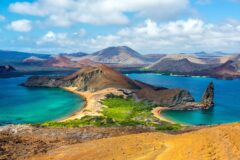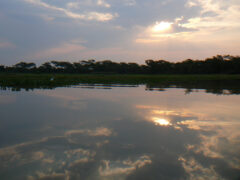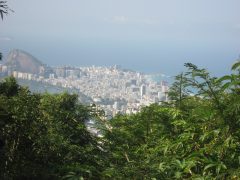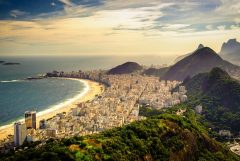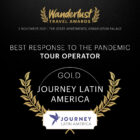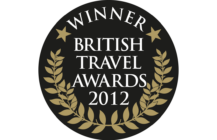Private Journeys
Value Brazil: The emerald coast
9 days from £1,425pp
(based on two people sharing & excluding flights)
Essentials
-
Tour info
-
Country info
-
What's included
Tour info
Transport
2 scenic road journeys (longest 4/5hrs); 2 boat journeys (1.5hrs).
Accommodation
Small, friendly hotels, colonial or modern in style with well-equipped rooms, private bathroom and heating.
Meals
Breakfast daily, lunch day 4.
Guides
We carefully select our local partners, some of whom we have worked with for over 25 years. Their English-speaking guides understand the expectations of our clients very well, and are consistently singled out for praise by the latter on their return.
Summary Of Nights
9 days, 8 nights: Rio 2; Paraty 2; Ilha Grande 3; Rio 1.
Optional Excursions
There are a number of half-, full-day or longer excursions or activities you may wish to consider in order to customise your holiday to cater for your interests. Please contact us to discuss these further or to add them to your itinerary before you depart. A selection of these:
- Cable car ride up Sugar Loaf Mountain
- Rio by Night – Samba show
Currency
The unit of currency in Brazil is the ‘real’ (plural reais).
How To Take It
Cash machines are available in all major cities and towns, and so taking a debit or credit card with a PIN number is the most convenient way of withdrawing money while on your trip, and in most shops and restaurants you can also pay by card. However, since cards can get lost, damaged, withheld or blocked, you should not rely exclusively on a card to access funds. We recommend that additionally you take a reasonable quantity of US dollars cash (no more than is covered by your insurance), which you can exchange into local currency, and possibly some travellers’ cheques, though these are gradually falling out of use (American Express are the most widely accepted). Dollar bills should be in good condition, soiled or torn bills may be refused. You can take sterling, but the exchange rate is not always competitive or even available, restricting the number of places where you can change money. There are no ATMs in Ilha Grande, be sure to change money to local currency before you go there.
Daily Spend
A budget of around US$40-$70 per day should cover the cost of not-included meals, drinks, local transport, tips and the odd souvenir. Prices of meals and drinks in standard restaurants are more or less the same as in Britain, perhaps a bit cheaper.
Tipping
Tips are expected and local guides often rely on their tip as a significant proportion of their income.
Most service industry workers will expect a tip of some kind and so it is useful to have spare change for hotel porters, taxi drivers and the like. It is common to leave 10 – 12% in restaurants.
Insurance
Travel insurance is essential.
Details of our recommended policy can be found on the Travel Insurance page.
Airport Taxes
If you have purchased your flights through Journey Latin America, the international departure tax is usually included in the ticket.
Trip Suitability
There are no long days of travel on this trip.
This holiday is suitable for all, including families (although you cannot book the latter with us online unless you require accommodation based on double occupancy rooms). In other cases, and if you have a disability or other special requirements, please call us.
In the summer months of December to March the weather is extremely hot and humid, you might bear this in mind if travelling with small children or the elderly.
Climate
In tropical Rio December to February are the hottest and most humid months, with temperatures reaching 40°C, and rain which falls in brief, heavy showers.
From June to September, temperatures are more moderate (18-23°C) and there is plenty of sunshine, but cold fronts can usher in periods of up to several days of cloud and drizzle. Weather-wise, March to June are good months for this holiday: it can rain at any time, but the sun can shine at any time too!
Clothing And Special Equipment
For day-to-day wear you should take light, loose-fitting, breathable clothes. (Of course, especially in Rio, the locals will often opt for tighter garments!) Comfortable shoes are important for walking and sandals are perfect for hot weather.
A sun hat, sun block, insect repellent and sunglasses are essential, and in winter – June to August – you should take a light fleece or jacket for cool nights and a waterproof layer, as well as swimwear. Note that in the Brazilian winter you can have lovely warm days in the mid-twenties centigrade when a northern European would be happy to sit on the beach but you won’t find many Brazilians hardy enough to do so! There can be cool, dull, drizzly days too. An umbrella is handy: especially in summer, the rain can be short-lived but falls in the form of a tropical deluge, when a rain jacket may not offer much protection. Take insect repellent to Ilha Grande.
Vaccinations
Preventative vaccinations are recommended against the following; typhoid; polio; tetanus; hepatitis A. For specific requirements you must consult your GP.
As of 2018, visitors to Brazil travelling on our holidays should be protected with a vaccination against yellow fever, and carry the corresponding certificate. In April 2013, the World Health Organisation Strategic Advisory Group of Experts on Immunisation concluded that a single primary dose of yellow fever vaccine is sufficient to confer sustained immunity and lifelong protection against yellow fever disease, and that a booster dose is not needed.
You can also find helpful information on the Masta Travel Health website.
Visas
Holders of a full British passport do not require a visa, although passports must be valid for at least 6 months after the trip begins. Anyone with a different nationality should enquire with us or check with the relevant consulate.
If flying to the US, or via the US you will need to fill in your online ESTA application.
Country info
When's the best time to visit Brazil?
Brazil is an all-year destination, but it’s a vast country: when you go will depend on your chosen itinerary and interests. Late Dec-Mar are the hottest months – very hot (over 40°C) from Rio northwards – and the local holiday season, so attractions can be very busy. During the Amazon’s wet season (Jan - Jun) it’s easier to get round by boat, the dry season is sunnier and better for wildlife-spotting but very hot. The Pantanal may be best avoided during the wettest months (Nov - Mar) when there are many mosquitoes. However this is the best time to visit the beaches of the south where it’s cool outside this period.
For more detailed information visit our When To Go section.
What's the official language of Brazil?
The official language of Brazil is Brazilian Portuguese; a more languid and musical version of Portugal's mother tongue. You will also find indigenous languages spoken in Amazonia.
How do I get local currency in Brazil?
The local currency in Brazil is the Brazilian Real. Notes can be withdrawn from the many ATMs at airports and in larger towns and cities. Limits may be lower than your UK bank allows. Banco do Brasil, HSBC accept UK credit or debit cards allowing daily withdrawals of 1,000reais. Bradesco allows a lower limit. Other banks eg Banco 24horas do not accept foreign cards. Most towns have a Banco do Brasil. ATMs close at 10pm. Currency is also obtainable in banks and money exchanges.
What is the time difference between Brazil and UK?
The time difference between the UK and Brazil is GMT -3 hours. There is daylight saving from Oct- end Feb (approx) when clocks are put forward one hour.
Do I need a visa for Brazil?
Holders of a full British passport do not require a visa, although passports must be valid for at least 6 months after the trip begins. Anyone with a different nationality should enquire with us or check with the relevant consulate.
If flying to the US, or via the US you will need to fill in your online ESTA application.
What vaccinations do I need for Brazil?
Please check Travel Health Pro for information on health recommendations and vaccinations for the destinations you are visiting. Please note that many Latin American countries require proof of vaccination against Yellow Fever if you have recently travelled to another country where Yellow Fever is present.
What are the festivals, cultural and sport events in Brazil?
Carnival offers 5 days of celebration in Feb/Mar. Live bands, costume balls, over-indulgence and general frivolity will take place in towns and cities all over the country. The best parades are in Rio, Salvador and Olinda.
Which countries combine well with Brazil?
Argentina: The crossing at Iguazú Falls is convenient for many visitors.
Peru: There is a direct flight from Lima to Rio de Janeiro (5 hours) and to São Paulo (4-5 hours with many connections to other cities).
Inspired by this trip
Our exciting range of articles on Latin America explore everything from iconic destinations and lesser-known cultural gems to delicious traditional recipes. You’ll also find exclusive travel tips, first-hand client reviews and the chance to get your personal questions answered by our travel experts.
Papagaio
Your edit for Latin American inspiration
Our exciting range of articles on Latin America explore everything from iconic destinations and lesser-known cultural gems to delicious traditional recipes. You’ll also find exclusive travel tips, first-hand client reviews and the chance to get your personal questions answered by our travel experts.
View Extraordinary Inspiration